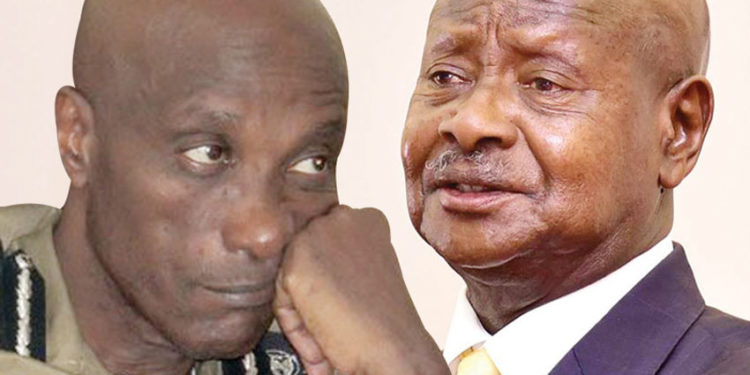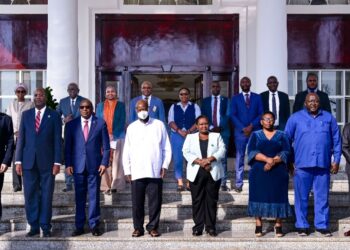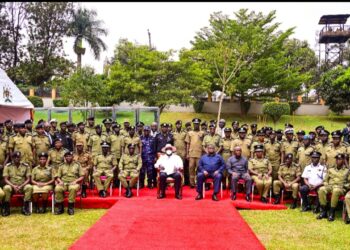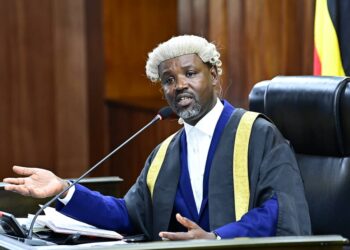The name Kale Kayihura is the most detestable substance that most opposition politicians, and supporters alike, would not wish to hear, moreso to Col Kizza Besigye, the man who probably would by now be the Country’s president had it not to be for that particular former chief cop.
The declaration of Besigye’s presidential aspirations in 2001 had sent an unprecedented wave of panic and uncertainty thought among the ruling National Resistance Movement.
Within a short time, Besigye had managed to rally a number of notable members of the Museveni Government such as the then Minister of Local Government Jabeeri Bidandi Ssali, Augustine Ruzindana, Amanya Mushega, Maj Gen Gregory Mugisha Muntu among others.
The development above gave way to a range of uncoordinated moves within the establishment to surmount a surely power ending road block to the then 15 year old NRM grip on power.
Noteworthy among the drastic measures employed by President Museveni to curtail Besigye’s strange rise to political prominence was the use of the Uganda Police Force, superintended over by the ruthless Kayihura, the man that had already written his name among most able soldiers during the Kisangani military expedition in Congo between 1997 and 2000.
Besigye had come with a strange brand of politics which Museveni had most likely just read about from the books of the great Asian liberation states men.
With the deployment of a clandestine political mobilisation, targeting the Museveni men and women that mattered, Besigye had build a formidable force of political strategists such as the then youthful Odong Otto, Busoga’s Proscovia Salamu Musumba, Professor Ogenga Latigo, Bugiri’s Philip Wafula Ogutu, Augustine Ruzindana, Amanya Mushega, Iganga’s Abdul Katuntu, Mbarara’s former Minister for Ethics and Integrity, Miria Matembe, Sam Njuba from Buganda, to mention but a few. These valuable men and women, supported by the adoption of a civil disobedience political strategy which involved street demonstrations and riots, formed the backbone of the Besigye attempt to eject Museveni from State House.
Within less than a year of open preparation to the polls, Besigye had managed to give Museveni a lesson of a life time by giving him the biggest civilian based political challenge he had not been experienced for the entire 15 years he had been at the helm of the Country.
As the following general elections drew closer, Museveni, who seemed to have learnt many lessons from the previous election during which he had nearly been sent back into an agonising early retirement in Rwakitura, was quick to conclude that the then soft Chief cop, General Katumba Wamala was not the right man for the police job and so he opted for a more ruthless name in Kale Kayihura, who took the reigns in 2005 and went on to become the regime’s longest serving police chief when he was finally axed in March 2018, having headed the force for a record 13 years.
At the Tim of his appointment in 2005, preparations for the 2006 general elections were in high gear, giving the new Museveni enthusiastic keeper a sure opportunity to prove his worthy at his new but highly challenging errand of shielding his boss from losing to a fully reinforced opposition under Besigye.
Having lost the previous election in 2001, Besigye had kept himself busy, though from exile in South Africa, coordinating a mass mobilisation drive which popularised his brand, making him a more threatening challenger by the time he returned in the wake of the 2006 polls.
The situation presented Kayihura with an opportunity of a life time, swinging into action to display the material he was made of, by throwing thousands of the anti Museveni activists behind bars, with Besigye himself the most affected victim having visited state coolers on more than 300 occasions during the Kayihura police administration.
He followed his former comrade in arms wherever he went and apprehended him on charges of unlawful assembly, treason, preventative arrests among others which all served Museveni well in a bid to keep Besigye under check.
The predominantly repressive methods were deployed against the former Museveni’s personal Doctor even during non electioneering times since Besigye had devised means of continuously fighting the government with a way of bringing it down at it’s weakest. With the persistent use of phrases like “ajjagenda” and the symbolic use of the Hummer by Besigye, which Museveni figuratively decoded to point towards a possible use of force to get power, the guard was not to be lowered at any point in life.
For instance in July 2011, police deployed heavily to intercept Besigye from accessing the city center during a protest March against the sky rocketing commodity prices in what was popularly known as walk to work demonstrations. At the Mulago round about, many opposition supporters were brutalised by the police force commanded by AIP Grace Turyagumanawe of the Central Police Station. One officer called ASP Gilbert Bwana Arinaitwe lashed at Besigye’s vehicle, breaking into it before he spread the occupants with paper, which nearly blinded them including Besigye.
Besides employing the militaristic strategies to keep Museveni’s rule afloat, Kayihura was an established mass mobiliser. In 2010, he mobilised a group of at least 5 million Ugandans under the guise of volunteer electoral community policing assistants known as police constables. The group, whose training and orientation was conducted at every district around the country, attracted many desperate young men and women who had been promised jobs within the Police force. They were indoctrinated to vote for the ruling National Resistance Movement at the following year’s polls. They were also enticed by giving them police uniforms, a strategy that was intended to make them gain a sense of belonging and also to create fear among the public over what would seem like heavy police deployments in all the parts of the country, hence tilting the electoral waves I favor of the incumbent.
The strategy paid off handsomely, during the highly competitive general election with Museveni reportedly banking on the Kayihura mobilised voters beat his closest challenger, Dr Besigye.
Following the success of the police constables project in 2011, Museveni was so impressed that he asked his trusted keeper to come up with a new and more robust strategy a kin to that of 2011 so as to simplicity the 2016 bid.
Kayihura, using his position as AIGP, recruited 11m Ugandans who he gave a three months military training and later sent them back to their respective areas of residence. These were allegedly tipped on who to vote and were also used as a tool of political persecution, with opposition politicians facing their wrath on a number of occasions. With an indoctrinated 11 millions of votes, Kayihura had once again lived to his expectations, no wonder Museveni had rewarded him with a new contract as the IGP before things worsened later on, result in the general’s embarrassing exit on 4, March 2018.
One remarkable job that was left for the police chief to do for his master was sorting Besigye and his unrelenting supporters who had maintained that their Victory had been grabbed and hence Making clandestine arrangements that had them swear in Besigye on the 11 of may, a day before the official swearing in ceremony in Kololo.
Besigye was ruthlessly arrested and held in the Karamoja dungions, before being held at home for over two months, giving Museveni time to organise into his 5th term of the Presidency.
Through his 12 years at the helm of the force that was in spotlight for gross abuse of human rights, Kayihura knew nothing but loyalty. Not even his personal integrity would stand in his way of protecting his bosses interests. For instance, during the burial of late AIGP Andrew Felix Kaweesi in March 2017, Museveni had used the expendable chief cop’s name as a shock absorber against himself when he said that the force was full of criminal elements and with Kayihura in attendance.
With specific regard to the above enumerated grounds, the former Police chief had been arguably the strongest Museveni keeper who had over the years used all the tools available for himself to see to eat that opposition is kept a way from disorganising the status-quo from 2005 up to arguably the end of the current term.
Do you have a story in your community or an opinion to share with us: Email us at editorial@watchdoguganda.com












